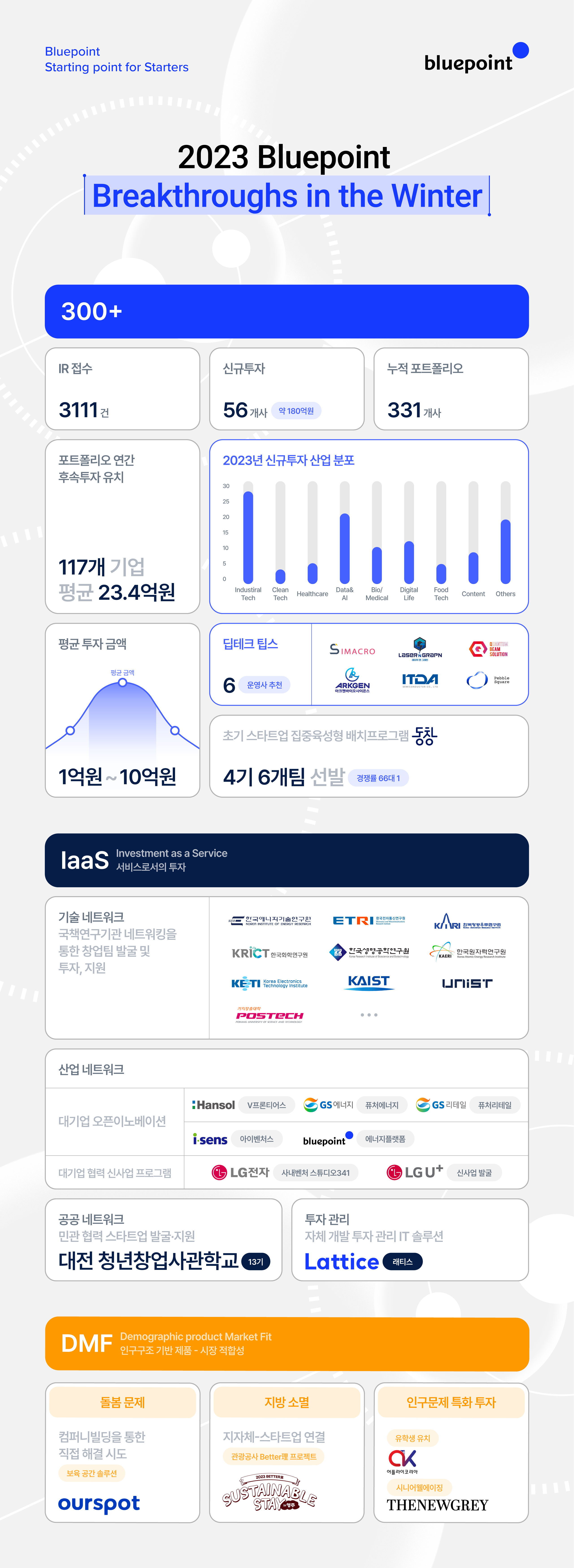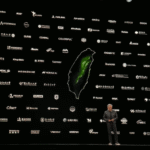
Accelerator (AC) Bluepoint Partners (hereinafter referred to as Bluepoint, 블루포인트 파트너스) has surpassed 300 cumulative portfolios. The firm also announced new investment directions with operations specialising in Infrastructure as a Service (IaaS) and Demographic product Market Fit (DMF).
Over the past year, Bluepoint has made new investments in 56 startups valued at approximately $13.5 million (KRW 1.8 billion), bringing the cumulative number of startups invested in by Bluepoint to 331 as of the end of last year.
The number of IR submissions has continued to grow during the investment slowdown, with 1,526 in 2021, 3,059 in 2022 and 3,111 last year. Bluepoint receives IR submissions through various channels, including regular investment requests, networking with research institutes, open innovation with large companies and its own placement programme.
The industry distribution of the 56 startups Bluepoint invested in last year was 26.7% industrial technology, 19.6% data and AI, 10.7% digital life, 8.9% bio and medical, 7.1% content, 3.6% healthcare, 3.5% food tech, 1.7% cleantech, and 17.8% other.
Of the total portfolio companies, 117 startups received funding last year, with an average funding amount of $1.75 million (KRW 2.34 billion). This represents a 40.9% increase in the number of companies and a 39.5% decrease in the average amount of funding compared to the previous year. This is likely due to a large number of startups actively seeking investment to secure a runway.
The Deep Tech TIPS programme, which was launched last year to support deep tech startups, saw 6 companies nominated and selected. The selected companies are SIMACRO, LASER N GRAPN, Q Beam Solution, ARKGEN BIOSCIONS, ITDA semiconductor and Pebble Square. The 4th batch of DongChang, a placement programme for pre-seed and early-stage startups, attracted an application ratio of 66:1, with 400 applicants for 6 spots.
Bluepoint proposes and strengthens “IaaS” to discover and invest in startups according to the needs of various organisations and enterprises. Rather than looking at investments solely in terms of monetisation, IaaS is a way for Bluepoint to connect the dynamics of startups with demand. Bluepoint also has the advantage of discovering startups with great expertise in specific areas.
Since its establishment in 2014, Bluepoint, which is headquartered in Daejeon, has been networking with various national research institutes, including Daedeok Innopolis, to help excellent technologies enter the market. Last year, Bluepoint discovered a number of deep-tech startups through networking with the Korea Atomic Energy Research Institute (Q Beam Solution) and the National Research Council of Science & Technology (Solvum).
‘The GS Challenge’ and ‘Hansol V Frontiers’ are open innovation programmes that started in 2020 and 2021 respectively and have been collaborating for several years, and are representative examples of Bluepoint IaaS. They create new value by connecting large companies looking for new business drivers with start-ups in need of industrial and capital infrastructure. Last year, Bluepoint expanded its collaboration with GS Energy to launch the Open Innovation Platform (held four times a year), which has led to the networking of various stakeholders in the energy sector.
Bluepoint has gone beyond the role of connecting start-ups to solve problems for large corporations. The company planned and operated Studio 341, an in-house venture aimed at spinning off startup teams from LG Electronics, and LG Uplus jointly explored new business models based on the startup ecosystem.
Bluepoint also operates the Daejeon Youth Entrepreneurship Academy, creating a model for public-private partnership to discover and support startups. Bluepoint has also developed its own investment management IT solution, Lattice, which can be used by both portfolio companies and investment affiliates, and is being deployed at actual investment sites.
In the past year, Bluepoint has focused on population issues, among others, as it believes that the challenging population issue requires startups to play an active role and investments to follow. The company held a forum on the topic twice a year and introduced a new concept called DMF, which is an evolution of PMF (product market fit).
DMF is a methodology that requires start-ups to find a marketable product or service in the context of changing demographics. Bluepoint also started the full operation of Company Building Project #1, ‘OURSPOT’, a children’s room in Mapo, Seoul, to solve the problem of childcare in the lower grades of elementary school.
In the second half of the year, Bluepoint worked with eight startups on the ‘2023 BETTER里’ (2023 Battery) demonstration project with the Korea Tourism Organisation to increase the living population in Gyeongbuk Province. The project involved various start-ups with ideas to overcome rural depopulation, including housing, activities and mobility. Other investments focused on population issues include Apply Korea, a mentoring service for international students in Korea, and THENEWGREY, a senior content and commerce company.
“Despite the challenging environment, Bluepoint has not stopped trying different things to continue our growth momentum,” said Yongkwan Lee, CEO of Bluepoint Partners. “This year, in addition to our existing strengths in deep tech, we will further explore population issues from the perspective of ‘the size of the problem is the size of the market’,” he said.



![[기고] 위험은 스타트업이, 열매는 공공이… 혁신의 주인공은 누구인가 3f3b00ac-efb7-456f-8bae-91cb3c75e27d](https://platum.kr/wp-content/uploads/2025/10/3f3b00ac-efb7-456f-8bae-91cb3c75e27d-1-150x150.jpg)


Leave a Comment